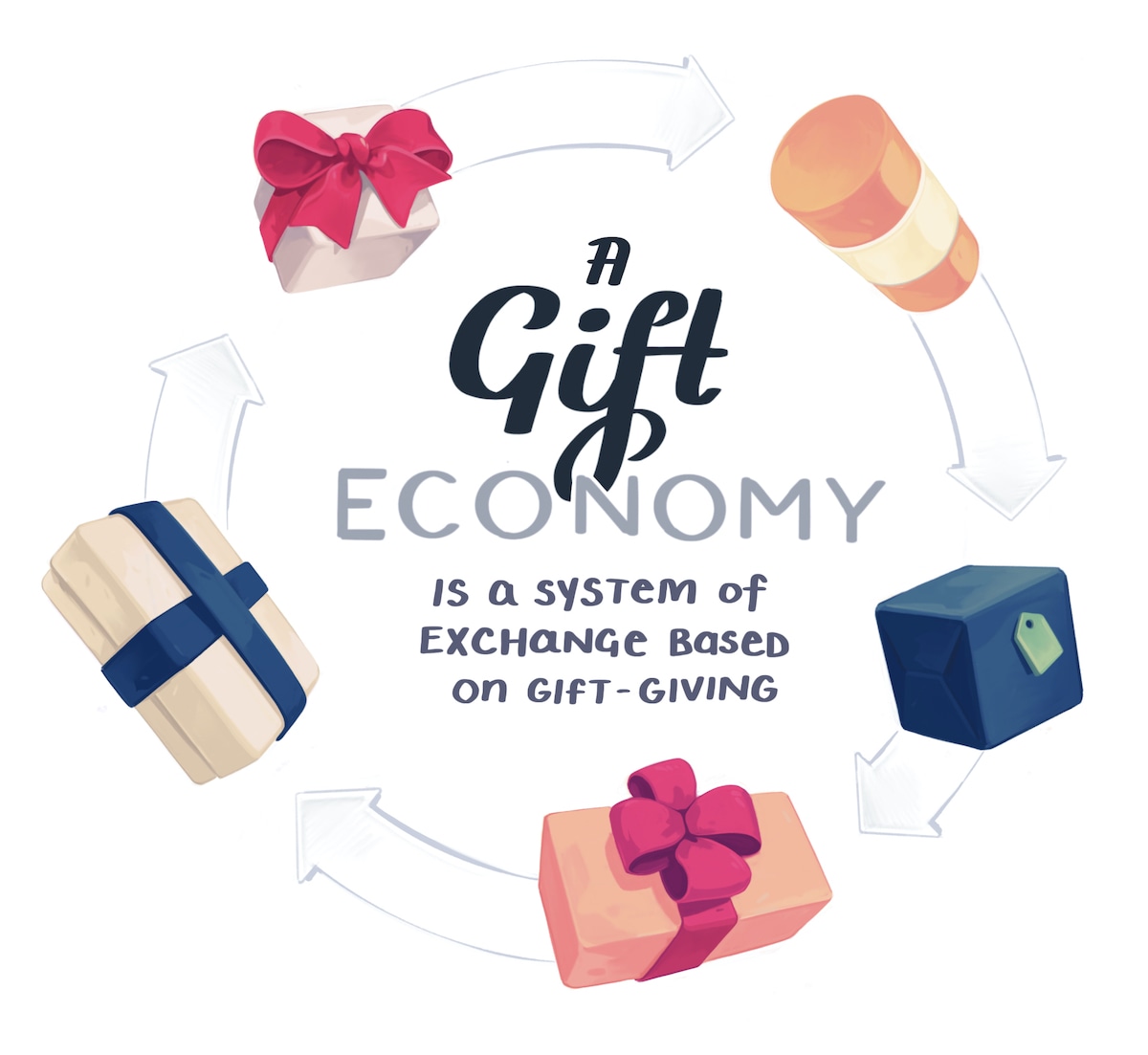The Gift Economy
Budding
🌿Last tended Aug 03, 2020
Anthropology
Economics
Illustrated Notes
A gift economy is a system of exchange based on gift giving.
Valuables are given without explicit agreement of future rewards between individuals, or within a contained community of people.

Gift economies have a few key qualities. They are...
- Loosely and informally tracked - it is bad form to calculate the exact value of gifts you receive, or keep an obsessive log of it the way we do with business finances
- Indirect - it is not always two individuals giving back and forth. Instead gifting is generalised to a whole community where you may give to people who have not given directly to you
- Delayed - we do not reciprocate gifts the minute we receive them, but instead wait to repay the offering at a later date
The emphasis in a gift exchange is on strengthening the bond between the givers and receivers.
It creates a kind of "positive debt," where two people or groups are now tied to one another - one party will always owe the other something. It's a purposeful way of entwining lives and communities together.
Why do we feel compelled to reciprocate gifts?
The grand mystery of gifting and gift economies is why we feel obliged to reciprocate. When someone gives you something, it sparks a strong desire to return in kind.
We don't have a pat answer to where this compulsion comes from, but we can certainly argue generosity and social connection are useful evolutionary traits if we want to get biologically reductive about it.

The Gift
Marcell Mauss
An anthropological classic on gift theory and gift economies. Published in 1923, Marcel Mauss explores how systems of exchange work in traditional societies around the world in relation to politics, power, and kinship.
Mauss concluded that the objects we are given "are seen to partake of something of the personality of the giver". 154
Mauss described it through the idea of the Maori idea of hau - the "spirit of the gift" where the giver's 'soul', or some kind of personal quality, is entangled with the gift object that wishes to return home to its owner. Thus compelling the receiver to make a return.
This interpretation of Maori hau ended up being strongly criticised as a misunderstanding and vast oversimplification of the true cultural meaning.
But the deeper idea Mauss was trying to get at is still worth highlighting. Just without a culturally appropriated term.
Reciprocating Appropriately
When we return a gift, our offering has to be of similar or slightly higher value than the original. But not by too much.
If you bring me a ginger biscuit with my cup of tea, and two days later I reciprocate with a gourmet, two-tiered red velvet cake with your name in icing, we would all consider that an awkward, creepy, and overall a socially inappropriate response.
Just giving you a ginger biscuit back works well enough. Returning a gift of the exact same value resolves the debt, but also breaks the cycle.
Everyone is now even, and there’s no more need to continue biscuit-gifting. We can safely return to the pre-biscuit-gifting-days, but doing so also weakens our social connection.
If I have a particular political or personal interest in strengthening our social relationship, I need to give you a treat of slightly higher value – perhaps a chocolate hobnob or home-made scone.
Which both demonstrates I'm invested in this relationship, and also leaves you slightly indebted to me, thus compelling the gift cycle onwards.

Gift Economies and Market Economies
We often contrast the Gift Economy with the Market Economy. This is a wild oversimplification, but humans like to think in Cultural Dichotomies.
Market Economies are systems of exchange based on buying and selling things with money. A market exchange is specific, quantifiable, direct, immediate, founded upon an explicit agreement. As in, this croissant costs £1 right now.
Buying an irrationally overpriced granola bar from an airport vending machine is an example of a pure market exchange without a social layer. It’s me, a machine, and a £3 bar of sugar to help me survive this long layover.
I want food, and whoever owns this machine wants money. This is not the time or the place for a gift economy. It would be terribly inconvenient for me to rely on an unpredictable system of granola bar gifts from the strangers around me while starving in an unfamiliar airport.
There are humans who own this vending machine, who will eventually get that money. But they are very far away in time and space – both geographically and socially.
If challenged, I would have a terrible time tracking them down and having a chat. I have only the weakest sense of a human relationship with them, and there is hardly a social bond being woven – this granola bar is about an immediate and specific exchange of needs.
Here, the market economy works wonders. Life necessities like food, shelter, and water are not good candidates for a gifting system. Which is why we tend to gift luxury items, novelties, and socks.
This is also why it's problematic when food, shelter, and water are framed as "gifts" which is sometimes how charitable donations work – as optional acts of generosity.